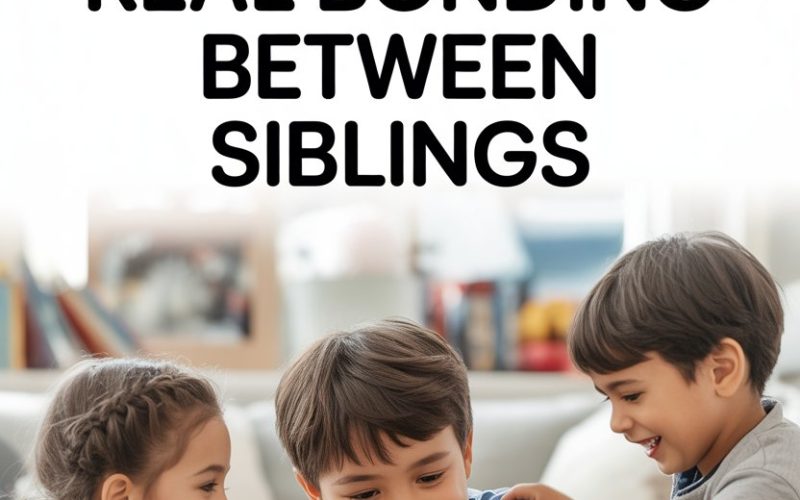Sibling relationships are a wild ride: one minute, it’s giggles and whispered secrets, and the next, it’s “Mum, he looked at me!”
If you’re a busy parent wading through sibling squabbles (or desperate for a little peace and quiet), you’re not alone.
The good news? A little intentional fun can go a long way.
Here’s how to sneak in moments that turn rivalry into real connection—even if you’re running on fumes or caffeine.
1. Kitchen Chaos: Cooking (or Baking) Together
Every parent knows that feeding children is a full-time job, and feeding more than one can sometimes feel like a reality show challenge. But the kitchen is an underrated stage for sibling bonding.
Picture your kids, aprons tied a little too tight, hands covered in flour, giggling at who can crack an egg without shell fragments.
Cooking together encourages teamwork, communication, and patience—plus, it teaches life skills (hello, future flatmates who clean up after themselves).
If your schedule is slammed, start with something simple like pancake art or DIY pizza night.
For younger kids, spreading sauce or sprinkling cheese is an empowering task. Older siblings can be in charge of reading the recipe aloud or chopping (with supervision, unless you fancy a trip to A&E).
Research published in Appetite confirms that children who cook together are more likely to cooperate and show empathy. And yes, even squabbling over the last chocolate chip counts as “cooperation” in the real world.
Need ideas? Check out these kid-friendly cooking projects that get everyone involved.
Cleanup is, of course, another lesson in teamwork. Just remind them: many hands make light work, and whoever licked the spoon does the dishes.
2. Backyard Olympics or Living Room Challenges
No gold medals necessary—just some open space and a spirit of friendly competition.
Organising a mini sports day in the backyard or turning the living room into an obstacle course gives siblings a chance to work off excess energy and actually channel their competitiveness into something positive (rather than arguing over who gets the remote).
Design a series of challenges: hopping on one leg from the sofa to the door, balancing a book on their heads, or timing who can dress up in Dad’s shoes the fastest. Keep score if they’re into it, or just focus on the laughter and chaos.
Collaborative games, like three-legged races or building a “fortress” out of couch cushions, foster trust. Siblings learn to rely on each other, coordinate their moves, and even share some victory dances.
According to a study in the Journal of Family Psychology, shared physical play boosts sibling closeness and reduces rivalry.
If the weather’s rubbish, try indoor scavenger hunts or silly charades—these get everyone moving and (miracle of miracles) working together.
3. Creative Time: Art Projects and Storytelling
You don’t have to be the next Picasso, and your offspring certainly don’t need to be.
What matters is giving your kids some paper, crayons, paints—or even a shoebox and recyclables—and letting their imaginations run wild. Collaboration is the magic word here.
Encourage your children to create a mural together or build a city out of cardboard boxes. Set a timer and watch as their teamwork (and ability to negotiate the use of the only working glue stick) blossoms.
The process is messier than a toddler’s nappy, but the pride in their shared creation is worth it.
Storytelling takes this a step further.
Have one child start a story, and the next adds a sentence, with each sibling building on the last. Hilarity (and occasionally, sibling-themed plot twists) will follow.
For inspiration, try the delightful Story Cubes—dice that spark endless silly tales.
According to child development experts, these shared creative experiences foster empathy and help siblings learn to appreciate each other’s strengths.
Plus, everyone gets a break from screens—and you just might end up with fridge art worth keeping.
4. Volunteering or Acts of Kindness as a Team
If you’ve got visions of your children bickering in the back seat, imagine them instead working side by side to help someone else.
Shared acts of kindness create a sense of unity; they also nudge siblings to see the world (and each other) a bit differently.
This doesn’t require organising a massive charity event. Even simple ideas, like making cards for a neighbour, helping at a local animal shelter, or picking up litter at the park, give siblings a shared goal.
For little ones, even sorting through toys to donate can be a joint adventure—especially if they get to reminisce about old favourites together.
Research from the Greater Good Science Center suggests that family volunteering increases empathy and reduces sibling rivalry, as kids are more likely to see each other as teammates rather than competitors.
If you want a quick win and minimal prep, try a family kindness challenge. Put ideas in a jar and let siblings pick one to do together each week.
You may be surprised how quickly “doing good” becomes a habit (and, with luck, spills over into how they treat each other at home).
5. Sibling-Only Rituals and Inside Jokes
Every family needs its own secret handshake—or at least a silly tradition that belongs to the kids alone.
These rituals can be as simple as a bedtime dance-off, a shared “good luck” chant before big days, or a Saturday morning pancake race.
The key? Let the kids lead.
When siblings create their own rituals, they develop a sense of shared identity and belonging. It’s their private club, one where parents are sometimes invited but rarely understand all the in-jokes.
Psychologists note that these shared experiences build trust and provide an emotional safety net, especially during stressful times.
Siblings who feel like they’re part of a special team are less likely to compete for parental approval and more likely to support each other through life’s bumps.
If your children struggle to come up with their own rituals, give them a nudge: “What’s something only you two (or three, or six) could do together every week?”
Sometimes, it’s as simple as who gets the last biscuit. Or invent a family award—“Best Sibling Hugger of the Week,” anyone?
When Sibling Bonding Sticks
You don’t need a month-long family holiday (or the patience of a saint) to help siblings become real mates. Just a bit of shared fun, a dash of teamwork, and the willingness to let things get a bit messy now and then.
Try one of these activities tonight—or whenever the arguing gets too loud for your sanity. You’ll be banking memories, not just refereeing squabbles.
And who knows? Those secret handshakes might just outlast the great sock wars of 2024.
Now, kettle on, feet up, and listen: are those giggles coming from the other room?
That’s the sound of siblings learning to actually like each other. Miracles do happen.




